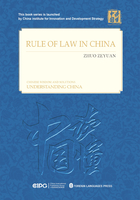
Chapter 6. Kang Youwei and Liang Qichao
When it comes to the dawn of the rule of law in China in the late Qing Dynasty, there is one name that cannot go without mention – Kang Youwei.
On a beautiful spring day in March 1858, Kang Youwei was born into an official’s family in Nanhai County, Guangdong Province. He was later nicknamed Kang Nanhai after his native county. Kang was an important politician, thinker and educator in the late Qing Dynasty and a representative of what was later called bourgeois reformism. He was exposed to western culture in his youth and fell deeply under its influence.
In 1879, Kang Youwei traveled to Hong Kong at the age of 22. After dipping into western civilization, he gained an understanding that the British people “ruled the country according to law” and changed his previous stereotype that “barbarians” were not civilized. This sparked his interest in learning more about Western culture. In 1888, he went to Peking again to sit the imperial exam. He wrote to Emperor Guangxu requesting reform. Somehow, his request never reached the emperor.
In 1891, he set up a school in Guangzhou and gave lectures. Liang Qichao was one of his noted students there. In 1895, when the Treaty of Shimonoseki was signed, Kang Youwei called on more than 1,300 imperial exam candidates to write to the imperial court to express their opposition. That was known in history as the Gongche Shangshu Movement.
With the support of Kang Youwei and Liang Qichao, Emperor Guangxu issued a series of reform measures and enacted relevant laws and regulations, which, however, did not succeed due to opposition from Empress Dowager Cixi. The reform lasted for only 103 days, from June 11 to September 21, 1898. Therefore, it was known in history as the Hundred Days’ Reform.
One cannot talk about Kang Youwei without mentioning Liang Qichao. In the spring of 1890, Liang Qichao was only 18 years old when took the eighth place in the Guangdong provincial imperial exam. His classmates introduced him to Kang Youwei, who was 33 years old. Kang had not done well in the imperial exams and remained a student of the Imperial Academy. According to rules, Liang Qichao, a successful candidate in the imperial exam, enjoyed seniority over Kang, and began the encounter with a somewhat complacent attitude. But after the two had met and talked for hours, Liang was deeply impressed with Kang’s knowledge and attitude. It quickly dawned on Liang that what he had learned previously was no knowledge at all, just tools for dealing with the imperial exam. Liang deeply admired Kang, and insisted on following him as his student. Therefore, Liang Qichao became one of Kang’s students in his Guangzhou school and the two developed a deep bond. After the failure of the Hundred Days’ Reform, Liang Qichao and Kang Youwei both fled to Japan.
In Japan, Kang Youwei had with him the so-called “secret imperial edict” of Emperor Guangxu, and continued to defend the monarchy and the Qing Dynasty. Liang Qichao joined Sun Yat-sen and other revolutionaries, committed to overthrowing the Qing Dynasty and establishing a democratic republic. That was when the teacher and student parted ways. Sometimes they even debated with and criticized each other in public.
After the Revolution of 1911, Kang Youwei advocated the restoration of the monarchy of the Qing Dynasty. He took practical actions to promote the restoration. He opposed Yuan Shikai’s claim to be the Hongxian Emperor while colluding with Zhang Xun on the Qing restoration. During the 12 days of the successful restoration, he was appointed as the vice president of the Privy Council and honored with the top official ranking.
However, in Liang Qichao’s view:
“I love Confucius, but I love truth more. I love my ancestors, but I love my country more. I love my old friends, but I love freedom more.”
“I dare say that since China has been declared a republic, it will never return to monarchy in the coming tens of thousands of years. Should you be as virtuous and holy as Yao and Shun, as violent as the first emperor of Qin and the first emperor of Ming, or as cunning as Cao Chao and Sima Yi, you will never be accepted as another emperor.”
From a pure moral point of view, they were both reputable scholars. Late in Kang’s life until his death, Liang still showed great respect for Kang as his student. From time to time, Liang had provided assistance to his teacher financially. After Kang’s death, Liang joined other students in a memorial service for Kang. Liang showed respect for Kang although he didn’t agree with him on many issues, which is quite touching and inspiring. It was quite normal for thinkers in that era of great change to hold divided opinions. They all had their own ideals and strove to achieve them. In the eyes of future generations, they are both worthy of respect for the efforts they had made, which made them shining stars of their times.